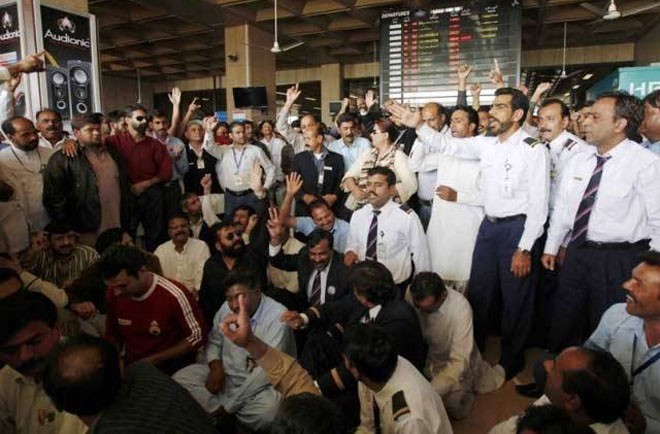
The PIA strike provides an opportunity for the opposition parties to rally against the government, albeit temporarily

After almost a week-long strike and agitation by the employees of Pakistan International Airlines, the harsh tone of the government has given way to a softer stance, bringing the issue on the dialogue table. Meanwhile, the strike has left an impact on the political scene and almost united the opposition.
The ruling Pakistan Muslim League Nawaz (PML-N) dealt with the PIA trade union workers in a tough manner -- including using force and weapons to disperse the protestors and directing the law enforcement agencies to harass the employees. In some cases, employees and their relatives were even picked by the law enforcement agencies and kept in safe house to put pressure on the unions to call off their strike.
According to official reports, at least three PIA workers died and many were injured in these violent protests.
All opposition parties, including the major Pakistan Peoples Party (PPP) and Pakistan Tehreek-i-Insaf (PTI), opposed the PML-N strategy of dealing with the issue -- terming it "civilian dictatorship". This seems like a window of opportunity that arrived at just the right time for the opposition. According to analysts, this is what actually forced the government to talk to the PIA workers, even though it did succeed in creating divisions among the PIA unions’ ranks.
The government preempted the political designs of the opposition parties and cashed in on the divisions in the PIA trade unions. This has brought a pause in the political activism against the regime. This may be temporary relief as the sensitivity of the issue remains. In the current situation, International Monetary Fund (IMF) has also sanctioned a further delay regarding the privatisation of PIA -- giving another six months to the government to better deal with the situation.
"The political activism is over after the calling off of the strike. However, this is for the moment only; in future it may enhance the problems of the government if not dealt wisely," says political analyst and columnist Ayaz Amir. "The strike has, however, brought the issue on the forefront of the political canvas."
Two weeks ago, Prime Minister Nawaz Sharif had in a public statement maintained that some political parties were backing the agitation of the PIA workers, warning that the striking employees would face action. This meant they could be terminated from service or face one year imprisonment under the Essential Services Act, recently enforced to put pressure on the protesting PIA workers.
"The political parties were playing politics on the issue. Their participation in the protesting rallies was small and they had not stood with the PIA workers fully and practically," says analyst Hasan Askari Rizvi, adding that such weak campaigns cannot bring any government down. He says Pakistan’s labour unions have also weakened with the passage of time and that is also a reason the PIA campaign could not get momentum or become a serious problem for the government.
For the time being, according to Rizvi, the government has successfully come out of this crisis and the future survival could be in a careful and transparent privatisation. "They have wrong strategies, there is lack of transparency and no detailed discussion on the issue in the parliament. Government is focusing only on top-down development rather than making its policies and plans participatory -- and that creates political space for the parties too."
"In the past, there have been issues because of lack of transparency in the privatisation of Pakistan Telecommunication Limited and Heavy Electric Complex," says Rizvi.
"Trade unions are weak and the PIA workers have failed to make it a bigger countrywide campaign with the help of other trade unions like Pakistan Railways’ workers. Unless a massive campaign is made, these issues would politically die down soon. The government has managed to get temporary relief," says columnist Nazi Naji, who wrote a couple of columns predicting a political crisis for the government and hunting at its inefficiency.
Although talks between the government and PIA workers have started and a Joint Action Committee of PIA trade and workers union has demanded the government to postpone the PIA privatisation for at least a year, there are signs of more political activism by the opposition parties in the near future.
The government has announced not to take back the Essential Services Act any time soon and announced disciplinary action against the protesting employees as well. In a recent move, show-cause notices have been served on many PIA workers for participating in the protest, terminating the services of many daily wage employees who had opposed privatisation. There is scope for the opposition parties to rally against the government if the latter falters on any count.